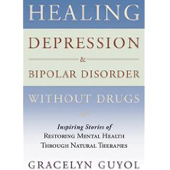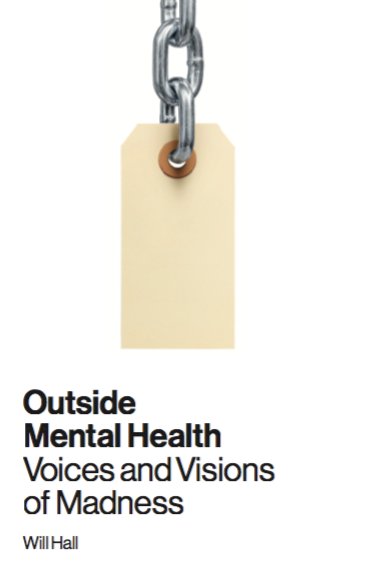Holistic Drug Alternatives: Gracelyn Guyol
First Aired: 12-04-2008 -- 5 comments | Add comment

Grace Guyol, diagnosed with bipolar disorder and author of Healing Depression and Bipolar Disorder Without Drugs: Inspiring Stories of Restoring Mental Health Through Natural Therapies, discusses nutrition, supplements, and holistic health care for helping people diagnosed with severe mental illnesses.
GGuyol (at) aol.com
Podcast: Play in new window | Download (Duration: 55:30 — 50.9MB)
Subscribe: RSS



























 Creative Commons 2.5 copyright
Creative Commons 2.5 copyright
> Hi there,
>
> Thank you for being such an instrumental part of my decision to titrate off
> of 9 medications. My entire life has been overshadowed by mental illness and
> I’m so fortunate to be living my life as a human being. I’ll try to be brief
> with a small history so that I can best frame some important questions I
> have for you.
>
> Like many people with mental illness, I was treated for depression at a
> young age. I started taking medications at 14 and my diagnosis was changed
> to Bipolar when I entered college. The University of Pennsylvania
> represented my biggest life dream. I had always dreamed of going to an Ivy
> League school, especially the one where my father has been a doctor and
> conducted 40 years of neuroscience research. I was forced to leave after one
> year. This also happened to be the year that I was administered heavy duty
> psychotropic medications and my parents began their divorce.
>
> For ten years I played around in the automotive industry since I had a
> passion for auto mechanics and racing. It was the only thing that soothed my
> soul. I was in and out of the hospital for years. I was walking dead. A
> couple of years ago, I moved out of Philadelphia to West Palm Beach Florida.
> The warm weather and sun were very helpful.
>
> I hired a prestigious psychiatrist whose reputation was confirmed by many
> people in the area. He gave me hope that he could “fix” me. His first step
> was to take my off of anti-depressants, which was an excellent move.
> However, by the end of a year with him, my cocktail of medications rose to
> 9. He recommended ECT and after a modest trial of ECT, I was no better than
> I was before. Although I didn’t feel as if I suffered any side effects, it
> was a traumatic experience.
>
> The turning point came when the scale ticked 30 pounds higher than it was
> only 3 months prior. I was taking 4 medications just for sleep and still
> binging on sweets non-stop. Even though my cocktail “was not shown to cause
> cognitive impairment”, I felt like an imbecile. I could not do simple math
> in my head. I decided that my life could not get any worse, so I stopped
> seeing my doctor and began very carefully eliminating medications.
>
> I do want to mention a very unusual experience with a psychiatrist. While I
> have many negative feelings against UPenn psychiatrists, several months ago,
> I had a consultation with a “big dog” at UPenn. While I had been through all
> of the doctors in Philadelphia while I still lived there, Dr. Thase, who
> runs the UPenn Mood Disorder Research Program and specialized in bipolar,
> agreed to consult me. I had just left my Florida doctor and flew home to see
> my family. I had already started my final titration of Lithum but wanted Dr.
> Thase’s opinion. Instead of chastising me for becoming my own doctor, he
> said that it was completely sane to have wiped my slate clean from
> medications. He said that people have been bipolar since the stone ages and
> that medications only change the cycle of the illness, not eliminate it. He
> mentioned that I had a 50% chance of getting of Lithium successfully and the
> same chance of any new medication helping me. He wished me luck with what I
> was doing, helped me find a holistic doctor in Florida and told me that he
> would be my doctor when I returned to UPenn. What an incredible man and
> perhaps someone you could interview in the future.
>
> I have an enormous success story. I am still titrating my Lithium (10mg
> every two weeks), but my life is immeasurably different. The only medication
> I take is my 70mg of Lithium, which in several months will be obsolete. I
> have been holding down a job (at Apple) for months, something I have never
> been able to do before. I started school last semester at a local Florida
> college and took a biology course. I did so well, that I was asked to be a
> TA for the following semester. I am starting to look for groups to whom I
> can share my story.
>
> The only way I was able to be so successful was with several tools. My diet
> was paramount. I did so much research and experimented with many methods of
> nutrition and supplements. A specific routine in exercise has also been
> important. Luckily, since the age of 18 I started to write a book centered
> on my emotions and mood disorder. Essentially, I have a chronological
> account of my psychiatric treatment to date.
>
> I’m now a biology convert. After learning how the body works and knowing my
> own psychiatric experience, I have decided to finish my schooling so I can
> educate the world about the largest crime against biology: psychiatric
> brainwash. While medications may have their place, every option must be
> exhausted before treatment with psychotropics. Of all the patients I have
> ever met in hospitals etc., none say that medications clear up the entire
> illness. I’m a firm believer that diet and exercise can help to reduce
> symptoms.
>
> I am able to go back UPenn in one year, but my heart is at Stanford. The
> school has a Human Biology program that touches upon natural methods to
> stress and disease reduction. That’s something that no east coast school
> could replicate as it’s that west coast mentality that lends to a course
> offering such as “the biology of relaxation”.
>
> It will be very difficult to get into Stanford. While I left UPenn with a B
> average, I’m ten years out of school. i must do something extraordinary to
> show that the school could choose no better candidate. The idea of composing
> a scientific study centered on diet has been with me for a long time. Now
> would be the perfect time to push ahead and complete it not only for my
> future, but to benefit those who need help like me. I have some involvement
> in the raw food community and have weaved simple nutrition tricks into my
> daily regimen. For example, I can envision recruiting various patients with
> bipolar or schizophrenia and adding only one thing to their “normal” diet: a
> green smoothie. A green smoothie packed with different supplements each
> morning for breakfast is simple yet one of the most important things I have
> enacted in my life.
>
> The thought of a scientific study led me to think more about my future and
> what I would do exactly with a Human Biology degree. Doctors and consumers
> need proof that something is effective. Since the pharmaceutical industry so
> readily pays for trials on chemical remedies, I think that there needs to be
> a huge movement to conduct trials on alternative methods. I see that the NIH
> had the Complementary and Alterative Medicine branch to its organization,
> but it’s utterly incomplete and not treated with the same clout as typical
> clinical trials. I hope to be a crusader in preventing people from
> experiencing the same things as myself, but I don’t know how people make a
> living doing this.
>
> Your interview with Dr. Breggin was incredible. I’d like to email him and
> see what possibilities there are for someone like me in terms of a career.
> But for right now, my aim is to do something useful with my one year period
> before I go back to one of two amazing schools. Because of your vast
> experience, I was hoping to gain your insight into a possible career,
> education, the presence of alterative mental/general health studies and
> ideas for a study I could conduct.
>
> Thanks so much for your amazing work. You’ve changed my life.
>
> Erica Liebman
In late December 2010 Johns Hopkins released a article on milk casein protien causing immune reactions in bipolar patients. The article specifically states “collectively, these findings provide a strong indication that psychosis may be related to casein immunoreactivity.” Further, “a manic component to this disease may also be supported by this finding of highest casein seropositivity…” They did not find any corelation of anti-casein IgG levels with depression symptom severity scores; however, patients who most recently had a depressive episode had a trend toward elevated IgG levels…
To read full article see EG Severence “Immune activation by casein dietary antigens in bipolar disorder” Bipolar Disorder 2010 12:834-842
Hope this helps. For those that beleive they are affected by milk see your allergist and bring this article along. G.I. physcians may also be helpfull if you are aware of casomorphin peptides in milk that pass thru the intestinal wall and effect IgG levels. Do reseach on bovine beta-casomorphin 7 (casomorphine)and psychiatric disorders.
Recently there has been studies done by Johns Hopkins University on the prevelance of celiac disease, gluten sensitivity, and milk casein protien causing psychosis, bipolar disorder and schizophrenia. The prevelance rates are extremly high with celiac tTG antibodies being present in over 5% of a group of 1400 schizophrenics studied. Antibodies for gluten sensitivity were present in 23% of the same population. In a simular study done on 95 psychiatric patients with mixed diagnosis, milk casein was singled out for causing psychosis in up to 55% of that population. There have been numerous studies in the past on gluten and schizophrenia going back to the mid-1960’s. Dr. F.C. Dohan was one of the first to notice the relationship between celiac and schizophrenia. Robert Cade the inventor of Gatoraid was also a pioneer in milk casein/gluten research finding that his population of 120 schizophrenics when on a gluten/milk free diet, or on dialysis would go into complete remission. For more information see EG Severence Schizophrenia Research 2010, and Cascella NG, Schizophrenia Bulletin 2009.
Thanks Dion for this important info. Changing my diet and understanding my allergies have been key in my own wellbeing.
–Will
I loved it!